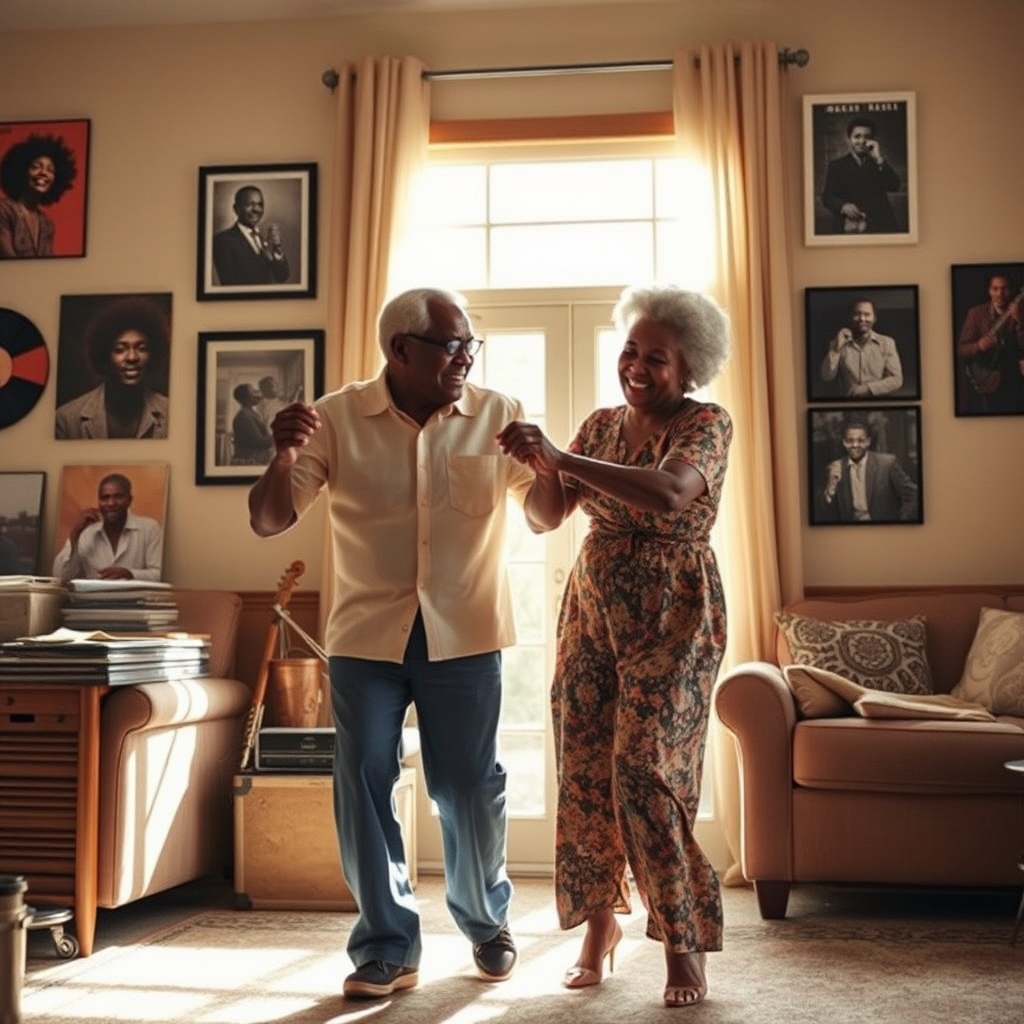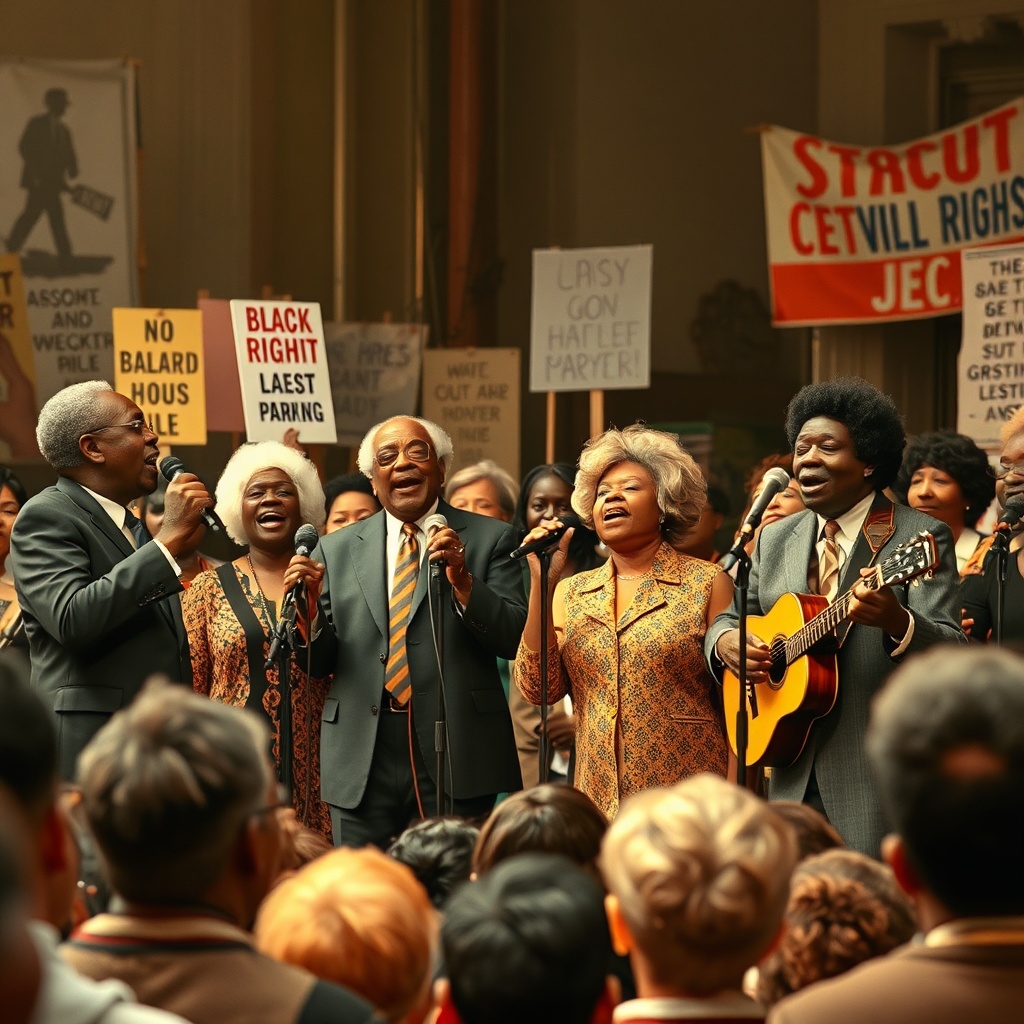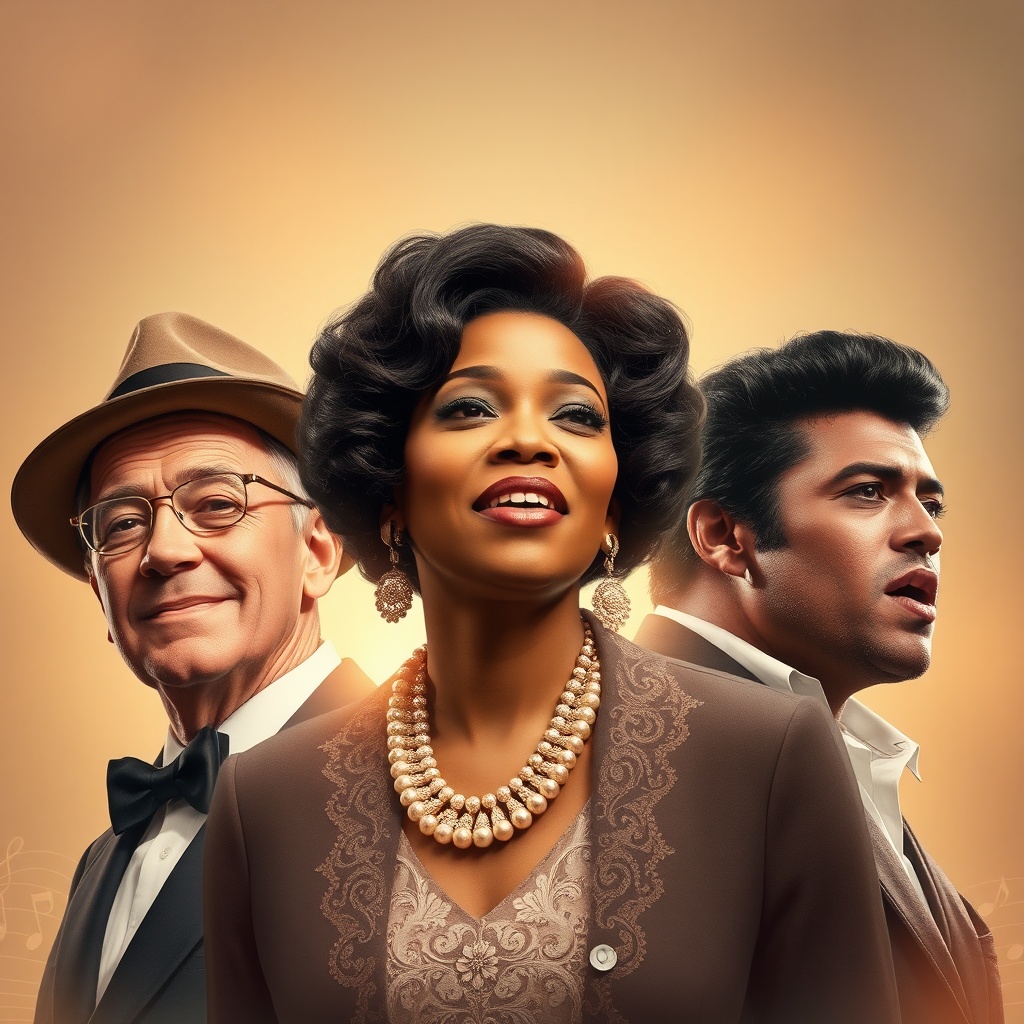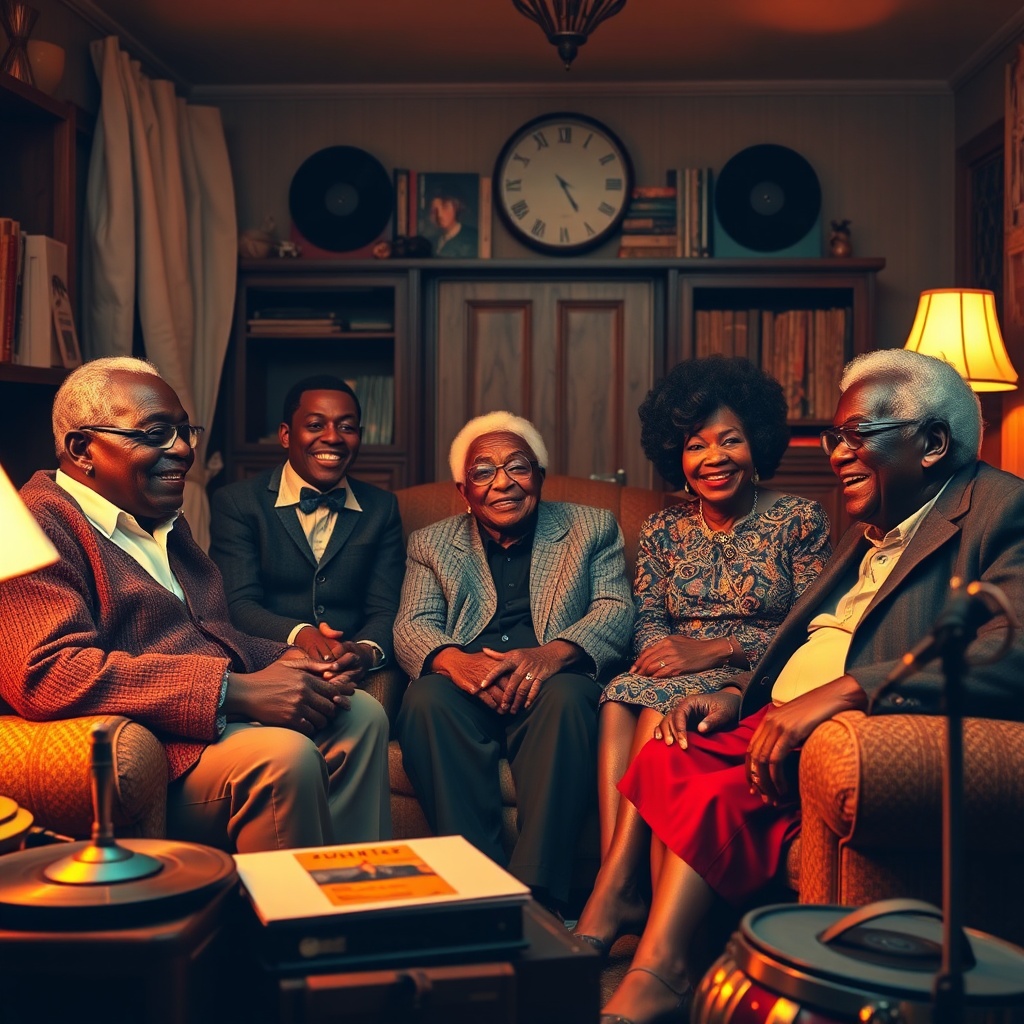Resonating Rhythms: How Black Voices Shaped the Soundtrack of a Generation

In the vibrant tapestry of the 1960s, black singers emerged as powerful voices that not only entertained but also inspired social change. Their music became the soundtrack of a generation, echoing the struggles and triumphs of an era.
The Cultural Landscape
As we explore this rich history, let’s take a moment to reflect on how these artists resonated within the cultural landscape:
- The Civil Rights Movement: Music served as a rallying cry, uniting voices for justice.
- Musical Innovation: Genres like soul, rhythm and blues, and gospel flourished, creating new sounds that influenced countless artists.
Key Voices of the Era
Several iconic singers defined the sound of the 1960s:
| Artist | Notable Songs | Impact |
|---|---|---|
| Aretha Franklin | “Respect”, “Natural Woman” | Empowered women and became a symbol of the movement. |
| James Brown | “Say It Loud – I’m Black and I’m Proud” | Anthem of black pride and resilience. |
| Marvin Gaye | “What’s Going On” | Addressed social issues with profound emotional depth. |
| Nina Simone | “Feeling Good”, “Mississippi Goddam” | Voiced the pain and hope of the civil rights struggle. |
Music as a Catalyst for Change
The music of this decade was more than entertainment; it was a catalyst for change. Consider how these artists used their platforms:
- Protest Songs: Many singers wrote songs that directly addressed issues like racism, poverty, and war.
- Benefit Concerts: Artists organized events to raise awareness and funds for civil rights initiatives.
Legacy and Influence
The legacy of these artists continues to influence music today. Their songs resonate not just as musical masterpieces but as important historical documents. Reflect on how their messages are still relevant:
- Modern Artists: Contemporary musicians continue to draw inspiration from these pioneers.
- Social Movements: The themes of justice and equality remain prevalent in today’s music.
As we listen to the unforgettable voices of black singers from the 1960s, we are reminded of their profound impact on society. Their soulful echoes continue to inspire, reminding us that music is a powerful force for change.
Melodies of Change: The Impact of 1960s Black Singers on Civil Rights

In the vibrant tapestry of the 1960s, the voices of Black singers emerged not just as entertainment but as powerful instruments of change. These artists became the soundtrack of a revolution, their melodies echoing the struggles and aspirations of a generation fighting for civil rights.
The Soundtrack of a Movement
As you reflect on the 1960s, think about the songs that stirred your soul. Artists like Sam Cooke, Aretha Franklin, and Nina Simone used their platforms to address the injustices faced by African Americans. Their music became a rallying cry for the civil rights movement.
Key Songs that Shaped the Era
- “A Change is Gonna Come” by Sam Cooke: This song resonated deeply with the hopes of many. It spoke of struggle and the promise of a better tomorrow.
- “Respect” by Aretha Franklin: A powerful anthem that demanded respect not just for women but also for the entire African American community.
- “Strange Fruit” by Billie Holiday: A haunting portrayal of the horrors of racism, this song brought attention to the lynching of Black Americans.
- “Mississippi Goddam” by Nina Simone: A direct response to racial violence, this song was an urgent call for action.
Artists as Activists
Beyond their music, these singers became voices of the voiceless. They participated in marches, spoke at rallies, and used their fame to bring attention to critical issues. Imagine attending a concert where the lyrics were not just entertainment, but a call to arms.
The Legacy of 1960s Music
The impact of these Black singers transcended music. Their songs influenced policy changes and inspired countless individuals to stand up against injustice. As you listen to these timeless melodies, consider the stories they tell and the lives they changed.
As we celebrate the unforgettable voices of the 1960s, let us remember their contributions not only to music but also to the ongoing fight for equality. These melodies of change remind us that music can indeed change the world.
Iconic Voices: Celebrating the Legends Who Transcended Time

Introduction to the Legends
In the vibrant tapestry of music during the 1960s, Black singers emerged as powerful voices, not just in melody but in the movement for civil rights and social change. Their contributions shaped the landscape of music, leaving an indelible mark that resonates even today.
Influential Voices that Shaped an Era
Let’s explore some of the most iconic voices from this transformative decade.
- Aretha Franklin: Known as the “Queen of Soul”, her rendition of “Respect” became an anthem for both the civil rights and feminist movements.
- Sam Cooke: With hits like “A Change is Gonna Come”, Cooke’s music mirrored the struggles and hopes of a generation.
- Marvin Gaye: His smooth vocals and poignant lyrics, especially in songs like “What’s Going On”, addressed the social issues of the time.
- Nina Simone: A powerful presence in both music and activism, her song “Mississippi Goddam” poignantly captured the anger and frustration of the civil rights movement.
- James Brown: Often called the “Godfather of Soul”, his energetic performances and songs like “Say It Loud – I’m Black and I’m Proud” celebrated black identity.
Interactive Reflection
As you reflect on these artists, consider:
- Which song resonates most with you and why?
- How did these artists influence your views on social issues?
The Legacy of the 1960s Voices
The legacy of these artists transcends music. They inspired a generation to fight for equality and justice. Their songs continue to be powerful reminders of the struggles and triumphs faced.
Join the Conversation
Share your thoughts and memories of these iconic voices:
- What is your favorite memory associated with their music?
- How do you think their messages are relevant today?
In celebrating these legends, we honor not only their contributions to music but also their roles as champions of change. Their soulful echoes continue to inspire and resonate, reminding us of the power of voice and music in shaping our world.
From Gospel to Soul: The Evolution of Black Music in the 1960s
As we journey through the vibrant and transformative decade of the 1960s, we find ourselves enveloped in the rich sounds of Black music. The evolution from gospel to soul was not merely a change in style; it was a powerful reflection of cultural identity, social movements, and profound artistry. Let’s take a moment to explore this remarkable transition together.
The Roots of Gospel Music
Gospel music has deep roots in the African American community, serving as a means of spiritual expression and community bonding. Artists like Mahalia Jackson not only showcased their incredible vocal talents but also infused their music with messages of hope and resilience. Can you recall how those melodies used to resonate in the churches?
The Rise of Rhythm and Blues
As the 1960s unfolded, a new sound began to emerge from the gospel traditions. Rhythm and Blues, or R&B, started to gain traction. Artists such as Ray Charles and James Brown began to blend the emotional depth of gospel with the energetic beats of blues and jazz. Have you had a chance to listen to their iconic hits? What do those songs evoke for you?
Transformation into Soul Music
By the mid-1960s, the genre of soul music was born. This new style was characterized by its passionate vocals, rich instrumentation, and socially conscious lyrics. Aretha Franklin, often referred to as the ‘Queen of Soul’, captured the hearts of many with her powerful voice and emotive performances. How did her music impact your life during that time?
Cultural and Social Impact
The music of the 1960s was not just entertainment; it was a soundtrack to the civil rights movement. Songs like “A Change Is Gonna Come” by Sam Cooke and “Say It Loud – I’m Black and I’m Proud” by James Brown became anthems for change. Can you remember the emotions these songs stirred within you? How did they influence your perspective on the world?
Legacy of the 1960s
Even today, the echoes of those soulful voices continue to inspire artists and listeners alike. The artists of the 1960s laid the foundation for future generations, making their mark not just in music, but in society. Who are some of the contemporary artists that you believe are carrying on this legacy?
As we reflect on the evolution from gospel to soul, it’s clear that the journey of Black music in the 1960s was about more than just sound; it was about identity, struggle, and triumph. Let’s cherish these memories and share our experiences with one another. What are your favorite memories of this era?
Unforgettable Performances: The Moments That Defined an Era
Introduction to an Era
In the 1960s, music was not merely a form of entertainment; it was a powerful instrument for change and expression. The soulful echoes of Black singers resonated deeply through the fabric of society, capturing the essence of struggle, love, and hope. Let us embark on a nostalgic journey to revisit some of the unforgettable performances that defined this remarkable era.
1. The Night of Soul at the Apollo
Imagine the electric atmosphere of the Apollo Theater in Harlem, where legends were born on its stage. One unforgettable performance was by James Brown, who not only electrified the crowd with his energetic dance moves but also delivered a message of empowerment through songs like “Say It Loud – I’m Black and I’m Proud”. Can you recall the excitement of that night?
2. Aretha Franklin’s Historic Performance
Aretha Franklin, the Queen of Soul, delivered a performance that still echoes in our memories. Her rendition of “Respect” became an anthem for the civil rights movement. Picture her powerful voice soaring through the audience, demanding respect and equality. How did her music influence your perspective during those times?
3. Motown Magic
The Motown sound revolutionized music with its catchy rhythms and meaningful lyrics. Artists like Marvin Gaye and Smokey Robinson brought us unforgettable hits. Remember the first time you heard “What’s Going On”? It was more than a song; it was a call for peace during turbulent times. Share your thoughts on how Motown shaped your musical taste.
4. The Triumph of Billie Holiday
Billie Holiday, with her hauntingly beautiful voice, gave us performances that transcended time. Her song “Strange Fruit” is a poignant reminder of the struggles faced by African Americans. As you reflect on her music, what emotions does it evoke in you?
5. A Night with Nina Simone
On stage, Nina Simone was more than a singer; she was a revolutionary. Her performance of “Mississippi Goddam” was a fierce response to injustice. Can you still hear her voice echoing through the halls of history?
Conclusion: The Legacy Lives On
These unforgettable performances were not just moments in time; they were milestones that shaped our culture and inspired generations. As we reflect on these soulful echoes, let us celebrate the voices that defined an era. Which performances left the most lasting impression on you? Share your memories and let the music continue to resonate.
Cultural Chronicles: The Stories Behind the Songs of the 1960s
Introduction to the Era
The 1960s was a decade of profound change, marked by social upheaval, civil rights movements, and cultural revolutions. Music served as a powerful medium for expression and activism, especially among Black artists whose voices resonated with the struggles and hopes of a generation.
Key Themes in 1960s Music
- Social Justice: Songs became anthems for civil rights, emphasizing equality and freedom.
- Love and Relationships: Amidst the chaos, love songs provided solace and joy.
- Identity: Many artists explored themes of heritage and self-acceptance.
Notable Black Singers of the 1960s
| Artist | Key Songs | Impact |
|---|---|---|
| Aretha Franklin | “Respect”, “Think” | Embodied empowerment and the civil rights movement. |
| James Brown | “Say It Loud – I’m Black and I’m Proud” | Promoted Black pride and cultural identity. |
| Marvin Gaye | “What’s Going On” | Addressed social issues with a deep sense of empathy. |
| Nina Simone | “Mississippi Goddam” | Highlighted racial injustices and oppression. |
The Stories Behind Iconic Songs
Aretha Franklin’s “Respect”: Originally written by Otis Redding, Franklin’s rendition transformed it into a feminist and civil rights anthem. Her powerful vocals demanded respect and equality, resonating across various movements.
James Brown’s “Say It Loud – I’m Black and I’m Proud”: This song was a bold declaration of racial pride during a time of widespread discrimination. Brown’s influence went beyond music, inspiring a generation to embrace their identity.
Marvin Gaye’s “What’s Going On”: Inspired by the social turmoil of the time, Gaye’s heartfelt lyrics reflected the pain and hope of communities. This song’s release marked a significant shift in the way artists addressed societal issues.
Nina Simone’s “Mississippi Goddam”: Written as a response to the 1963 bombing of the 16th Street Baptist Church, Simone’s song was a raw and powerful reaction to racial violence. It urged listeners to confront the harsh realities of racism.
Conclusion: The Legacy of 1960s Music
The contributions of Black singers in the 1960s laid the groundwork for future generations of artists. Their songs continue to inspire, educate, and invoke change, echoing the soulful struggles and triumphs of their time.
Echoes of Empowerment: Music as a Catalyst for Social Change
Music has always held a special place in the hearts of many, but during the 1960s, it became a powerful tool for social change. The soulful voices of Black singers not only entertained but also inspired and mobilized a generation. Let’s explore how these remarkable artists used their talents to amplify the cries for justice and equality.
The Power of Song
Music as a Voice: In times of struggle, music often serves as a platform for expression. Black singers in the 1960s used their voices to share the stories of their communities, addressing issues like racism, poverty, and civil rights. Songs became anthems of hope and resilience.
Example Artists:
- Sam Cooke – His song, “A Change is Gonna Come,” became a timeless anthem for the Civil Rights Movement.
- Aretha Franklin – Often referred to as the Queen of Soul, her music resonated deeply with themes of empowerment and equality.
- James Brown – Known for his energetic performances, his hit “Say It Loud – I’m Black and I’m Proud” celebrated Black pride and identity.
Music as a Movement
Through music, Black singers not only entertained but also educated and mobilized listeners. Concerts and festivals became gathering places for activists, where music and messages intertwined.
| Event | Significance |
|---|---|
| March on Washington (1963) | Featured performances by artists like Mahalia Jackson, who uplifted spirits during the historic rally for civil rights. |
| Newport Folk Festival (1965) | Bob Dylan’s performance, alongside Black artists, highlighted the intersection of folk and civil rights music. |
Legacy of Empowerment
The legacy left by these artists is profound. Their music continues to inspire new generations to fight for justice. Consider this: When you hear a familiar song from the 1960s, what memories or feelings does it evoke? How does it influence your perspective on current social issues?
Impact on Future Generations:
- Many contemporary artists draw inspiration from the music of the 1960s, using it to address modern-day struggles.
- The messages of empowerment and resistance remain relevant, reminding us that the fight for equality continues.
As we reflect on the unforgettable voices of Black singers in the 1960s, let us remember the role of music as a catalyst for social change. Music not only echoes the past but also empowers us to envision a better future. What songs resonate with you as symbols of empowerment? Let their echoes continue to inspire our journey towards equality.
A Harmonious Legacy: Honoring Black Artists Who Inspired Generations
Introduction to a Melodic Journey
As we take a moment to reflect on the profound impact of Black artists in the 1960s, we are reminded of the rich tapestry they wove with their voices. The music of this era was not just a soundtrack; it was a movement. Can you recall the powerful lyrics and the soulful melodies that resonated through your youth?
Voices That Shook the World
Artists like Aretha Franklin and Sam Cooke emerged as not just entertainers but as cultural icons. Aretha’s rendition of “Respect” became an anthem for the civil rights movement. What feelings does this song evoke for you?
The Spirit of the Times
The 1960s was a decade marked by social change and cultural revolution. Black artists were at the forefront, using their platforms to advocate for justice and equality. Do you remember how their music made you feel during those turbulent times?
Unforgettable Collaborations
Many artists collaborated to create timeless pieces. For instance, the partnership between Marvin Gaye and Tami Terrell produced hits that celebrated love and hope. Have you ever experienced the joy of singing along to their duets?
A Lasting Legacy
The influence of these artists can still be felt today. Their emotional depth and unique styles continue to inspire new generations of musicians. Which of today’s artists do you think carry the torch of these legendary singers?
Closing Reflections
As we honor the legacy of these remarkable individuals, let us celebrate their contributions to music and culture. Their voices still echo in our hearts. Take a moment to share your favorite song from the 1960s and the memories it brings back. What does this music mean to you?
Soulful Journeys: Personal Stories of Iconic Black Singers
Introduction to Soulful Journeys
In the vibrant tapestry of the 1960s, music was not just a form of entertainment; it was a powerful medium for storytelling and expression. Black singers of this era became the voices of a generation, sharing their personal journeys through melody and emotion. Let us take a moment to reflect on the soulful journeys of these iconic artists, whose experiences resonate with many.
Aretha Franklin: The Queen of Soul
Imagine a young girl in Detroit, singing in her father’s church, her voice echoing through the halls. Aretha Franklin transformed her passion for music into a message of empowerment. As she broke through the barriers of race and gender, Aretha’s songs like “Respect” became anthems for the civil rights movement. Can you recall how her music made you feel during those turbulent times?
James Brown: The Godfather of Soul
Known for his electrifying performances, James Brown was a force of nature. Born into poverty in South Carolina, he used his struggles as fuel for his creativity. With hits like “I Got You (I Feel Good)”, Brown infused joy and energy into the lives of many. How did his music inspire you to overcome challenges in your own life?
Nina Simone: The High Priestess of Soul
Nina Simone was more than a singer; she was a activist. Her haunting voice and poignant lyrics spoke of pain, love, and resilience. Songs like “Feeling Good” and “Strange Fruit” reveal her deep connection to the struggles of her people. Can you share a memory of how her music connected with your own experiences?
Marvin Gaye: The Prince of Motown
Marvin Gaye took listeners on a journey through love and social issues. His album “What’s Going On” is a timeless classic that addresses the turmoil of the 1960s. Marvin’s smooth vocals and heartfelt lyrics invite listeners to reflect on their own emotions. What messages from his songs resonate with you today?
Conclusion: The Legacy of Their Journeys
The stories of these iconic singers are woven into the fabric of history. Their music continues to inspire and uplift, reminding us of the power of the human spirit. As we reflect on their journeys, let us carry their legacies forward, sharing their stories with the next generation. What lessons have you learned from their incredible lives and music?
Voices of the Voiceless: How Music Gave Power to the Marginalized
In the tumultuous decade of the 1960s, music became a powerful vehicle for social change. Black singers, often marginalized and silenced, found their voices through their art. This section explores how their music resonated with the struggles of their communities and gave power to the voiceless.
The Power of Lyrics
Lyrics in music often serve as a reflection of the times. The 1960s were marked by the civil rights movement, and artists like Sam Cooke and Aretha Franklin used their songs to address inequality and injustice. For example, Cooke’s ‘A Change Is Gonna Come’ became an anthem for hope and resilience.
Music transcended entertainment; it became a movement. The following table illustrates some key songs and their impact:
| Song Title | Artist | Impact |
|---|---|---|
| A Change Is Gonna Come | Sam Cooke | Anthem of the Civil Rights Movement |
| Respect | Aretha Franklin | Empowerment for women and African Americans |
| Fight the Power | Public Enemy | Protest against systemic racism |
Building a Community
Through their music, these artists created a sense of community. Concerts and performances became gathering places where people could unite, share their experiences, and inspire one another. Music festivals like the Newport Folk Festival showcased black artists and emphasized unity in diversity.
The legacy of these artists continues to influence contemporary music. Their messages of empowerment and resilience are echoed in today’s songs, reminding us of the importance of using our voices to advocate for change.
In conclusion, the music of the 1960s served as a powerful tool for marginalized voices, transforming pain into purpose and struggle into strength. Through their unforgettable songs, black singers not only shaped a generation but also paved the way for future artists to continue the fight for equality.
